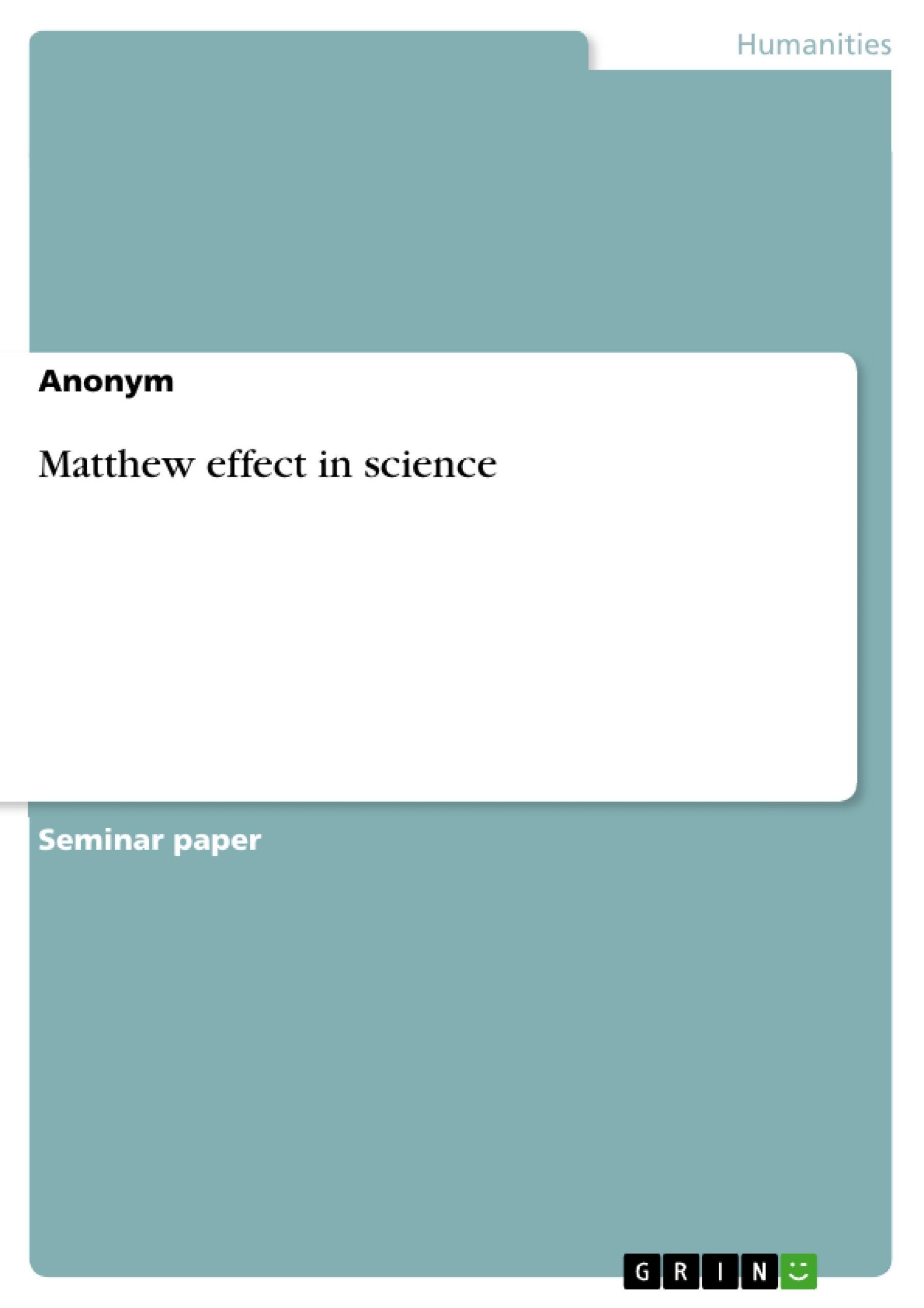Merton (1968) was first to coin the term „Matthew effect“, a phenomenon which describes the fact, that scientist of a higher status will receive more credit for similar work than scientists of comparatively lower status would receive. The research in this field has expanded to more areas than the scientific community, for example to sports careers or education and is often casually described with the phrase “the rich get richer and the poor get poorer”. During this work, the focus will lay on the scientific community. The particular topic of interest is the interaction between status effects, prize winning and citations as a form of perceived quality. Starting with an introduction to the theoretical background of the Matthew effect in science, we will learn that there are two components to the Matthew effect, namely the “reward system” and the “communication system”. In the following empirical part of the paper, we will first take an extensive look at a study which examines whether a status shock triggers a citation boost for the awarded scientist. The results will show a citation premium following the awarding of the scientist, but the effect is limited in time and strongest on recent productions. Afterwards, studies with similar topics, namely the Matthew effect in relation to citations or price winning, will be reviewed. Finally, a discussion on the research state regarding the Matthew effect is warranted. It will become clear that research in relation to this topic must overcome some hurdles. The measurement of status and quality, both variables who are anchored in the Matthew effect, is difficult. Furthermore, the question of cause and effect between status and delivered quality needs to be addressed. This work ends with a conclusive section and a possible outlook for future research.
Inhaltsverzeichnis (Table of Contents)
- 1. Introduction
- 2. Theoretical background
- 3. Empirical part
- 3.1. Prize winning and citations
- 3.1.1. Data
- 3.1.2. Statistical approach
- 3.1.3. Results
- 3.2. Other studies
- 3.1. Prize winning and citations
- 4. Discussion
- 5. Conclusion
- References
Zielsetzung und Themenschwerpunkte (Objectives and Key Themes)
This work examines the "Matthew effect" in science, focusing on the interaction between status effects, prize winning, and citations as a measure of perceived quality. It aims to understand how status influences recognition and the impact of awards on citation rates. The paper explores both the theoretical background and empirical evidence related to this phenomenon.
- The Matthew effect in science and its implications for scientific recognition
- The role of status and perceived quality in the scientific community
- The impact of prize winning on citation rates and the dynamics of the reward system
- The interplay between status, communication systems, and the allocation of resources in science
- The challenge of measuring status and quality in scientific research
Zusammenfassung der Kapitel (Chapter Summaries)
- Introduction: This chapter introduces the Matthew effect, a phenomenon where scientists with higher status receive more credit for similar work than their lower-status counterparts. It discusses the importance of this effect in the scientific community and highlights the specific focus on the relationship between status, prize winning, and citations.
- Theoretical background: This chapter delves into the theoretical framework of the Matthew effect, highlighting its two main components: the "reward system" and the "communication system." It explores how resources, access to research opportunities, and perceived quality contribute to the phenomenon. The chapter also examines Merton's "41st chair" thought experiment and the role of status diffusion in shaping the Matthew effect.
- Empirical part: This chapter presents a detailed analysis of a study examining the impact of status shocks, such as receiving a prestigious award, on citation rates. It explores the findings of this study and discusses the temporal limitations of the observed effects. This chapter also reviews other studies investigating the relationship between citations, prize winning, and the Matthew effect.
Schlüsselwörter (Keywords)
The primary focus of this work lies on the Matthew effect in science, examining its impact on scientific recognition and the interplay between status, prize winning, and citations as indicators of perceived quality. Key concepts explored include status, perceived quality, resource allocation, citation analysis, and the dynamics of the reward system in the scientific community.
Frequently Asked Questions
What is the 'Matthew effect' in science?
The Matthew effect describes how scientists of higher status receive disproportionately more credit and recognition for similar work compared to lower-status scientists.
Does winning a prize increase a scientist's citation rate?
Yes, studies show a "citation premium" following a major award, although this effect is often limited in time and strongest on the scientist's most recent work.
What are the two components of the Matthew effect?
The phenomenon consists of the "reward system" (how credit is allocated) and the "communication system" (how scientific information is disseminated and perceived).
What is the 'rich get richer' analogy in research?
It refers to the cumulative advantage where existing status leads to more resources, better access to journals, and higher visibility, further increasing a scientist's status.
Why is it difficult to measure the Matthew effect?
Challenges include the difficulty of objectively measuring "quality" versus "status" and determining the exact cause-and-effect relationship between them.
- Arbeit zitieren
- Anonym (Autor:in), 2021, Matthew effect in science, München, GRIN Verlag, https://www.grin.com/document/1297382



